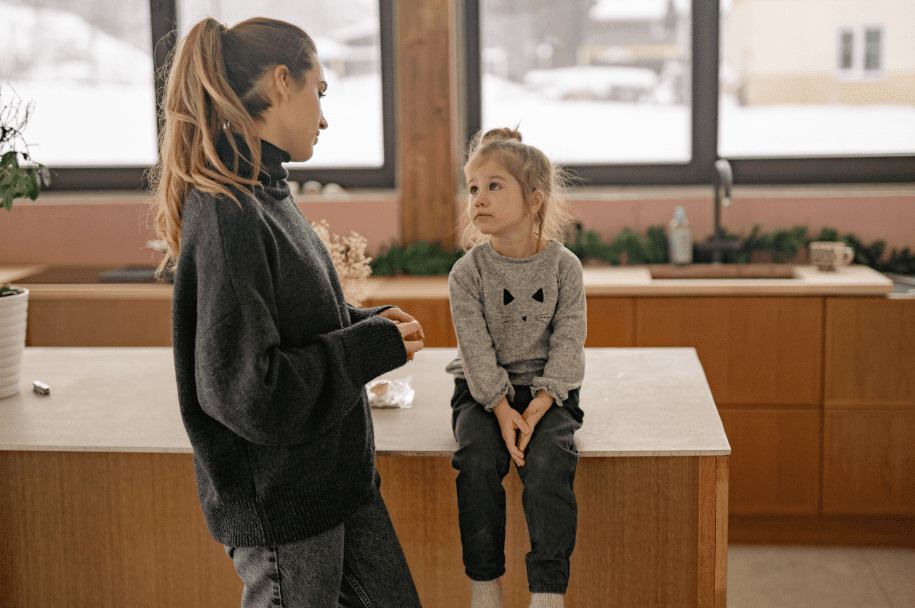Have you ever noticed how doing something small for someone makes you feel closer to them? It might seem counterintuitive, but research and experience show that we don’t always grow fond of people who help us. Instead, – we grow closer to people we help. This psychological phenomenon, known as the Franklin Effect, can be a surprisingly powerful tool for building stronger relationships—even in modern parenting.
The secret to a closer relationship in your home, is not just about what you do for your child but what you also allow them to do for you.
The Franklin Effect offers an unexpected yet effective approach to promoting connection, confidence, and cooperation in the family.
In this article, we explore how the Franklin Effect can transform your parenting approach, by turning everyday moments into opportunities for growth and connection. Through real-life anecdotes and practical tips, we will discover together how small acts of asking and receiving help can create lasting bonds with your children.
What Is the Franklin Effect Anyway?
The Franklin Effect gets its name from Benjamin Franklin, one of America’s founding fathers, who famously used this strategy to turn an adversary into a friend.
Franklin asked a rival to lend him a rare book. After the favor was granted, the man’s attitude toward Franklin shifted positively, and the two became friends.
Franklin observed, “He that has once done you a kindness will be more ready to do you another than he whom you yourself have obliged.”
In other words, is the result of one’s concept of self coming under attack. Every person develops a persona, and that persona persists because inconsistencies in one’s personal narrative get rewritten, redacted, and misinterpreted.
Wikipedia
This counterintuitive effect is rooted in psychology: when someone helps you, they rationalize their actions by believing they like you. As parents, we can use this principle to
- promote deeper connections with our children,
- teach them important life lessons, and
- build their confidence.
The Franklin Effect in Parenting

Parenting often feels like a one-way street of giving: cooking meals, helping with homework, solving problems. But have you ever thought about how asking your kids for help could strengthen your bond?
Here’s how you can make it work:
1. Ask for Small, Meaningful Favors
Start by asking your child to do something manageable but helpful. For example, you might say, “Can you help me fold these towels?” or “I could use your opinion on which photo to hang on the wall.” These small favors make kids feel capable and valued.
Anecdote: When my son turned eight, I started asking him to help me prepare dinner. At first, it was just simple tasks like stirring a pot or setting the table. To my surprise, he didn’t see it as a chore. Instead, he took pride in being part of the process. Over time, this little favor became his favorite part of the day, and we grew closer through our “dinner team” ritual.
2. Show Gratitude and Highlight Their Impact
After your child does you a favor, show genuine appreciation and explain how their help made a difference. This reinforces their positive feelings toward you and builds their self-esteem.
Anecdote: My teenage daughter once helped me brainstorm ideas for a community event. Afterward, I told her how much her creativity inspired me. Weeks later, she offered to help again, saying, “I loved seeing my idea come to life!” Her willingness to contribute blossomed into a shared passion for planning family activities.
3. Encourage Problem-Solving
Instead of jumping in to fix every issue, ask your child to think of solutions. Whether it is organizing toys, picking an activity for family night, or resolving sibling conflicts, giving them a chance to help teaches responsibility and strengthens trust.
Anecdote: One day, my younger kids were arguing over which board game to play. I asked my eldest to step in as the “peacemaker” and suggest a fair compromise. She loved being in charge of finding a solution, and the younger ones respected her decision. It’s become her unofficial role in the family—one she proudly embraces.
Why the Franklin Effect Works in Families
The Franklin Effect thrives on three powerful dynamics:
- Boosting Confidence: When children feel trusted to help, they gain confidence in their abilities and see themselves as capable contributors.
- Strengthening Bonds: The act of helping promotes a sense of closeness and mutual respect.
- Promoting Empathy: Asking for help teaches children to consider others’ needs, laying the groundwork for empathy and teamwork.
Turning the Tables: Let Kids Ask You for Help

The Franklin Effect isn’t a one-way street. Encourage your children to ask you for help, too. When they see you willingly lend a hand, it models kindness and builds trust. It also gives you an opportunity to reinforce their efforts with praise and encouragement.
Anecdote: My son once asked me to help him build a Lego spaceship for a school project. As we worked side by side, he suddenly said, “Thanks, Mom. I love doing stuff like this with you.” It reminded me how small moments of collaboration can create lasting memories.
Final Thoughts
Parenting is full of opportunities to connect with your children, and the Franklin Effect offers a simple yet effective way to deepen those bonds. By inviting your kids to help you in meaningful ways, you’re not just teaching them life skills—you’re showing them that they are valued members of the family.
So, the next time you’re folding laundry, brainstorming ideas, or tackling a household project, don’t hesitate to ask for a little help. You might just find that a small favor opens the door to a stronger, more loving relationship with your child.
What are some ways you’ve invited your kids to help? Share your stories in the comments below—we’d love to hear how the Franklin Effect works in your family!





Leave a Reply